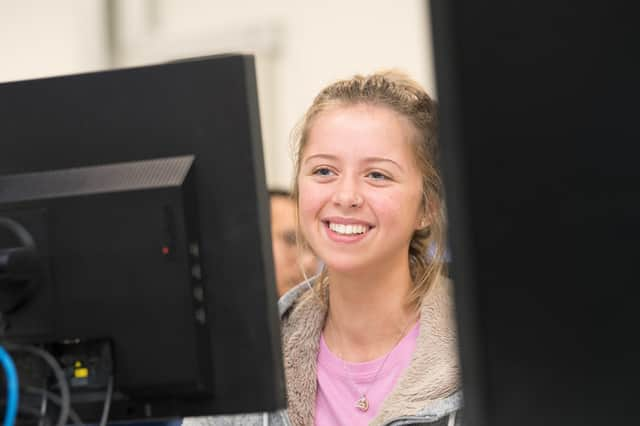Improving the gender balance in tech - comment


Naturally, I was furious when I received news of this ludicrous pronouncement. Gradually, however, the red mist lifted and I began to realise that this sorry little incident merely highlighted a larger problem: right from the outset, girls are discouraged from having anything to do with computers. The idea that computing is somehow a more suitable vocation for boys – that gender has anything to do with it, in fact – should not persist in 21st century Scotland.
And yet, our daughters are being told computers aren’t for them. Whether the message is delivered directly, or by more subtle means, such as in the portrayal of tech roles in popular culture, women are denied a potentially rewarding career in computing before they have ever had the chance to write a line of code.
Advertisement
Hide AdAdvertisement
Hide AdThis denial of opportunity is blatantly unethical, but it also stymies Scotland’s tech sector, with up to half the country’s talent pool written off from the moment they are born. And we are in desperate need of new talent: computing and related disciplines underpin virtually every aspect of the economy. Whether your business is concerned with banking, education, retail, or entertainment, technology will be vital to its successful operation.
The tech sector sees clearly the need to recruit more women into tech roles. Educational institutions want desperately to attract more female students to computing science courses. Government is keenly aware of the lack of diversity in the tech workforce, and the overall shortage of talent. But the problem persists, despite the best efforts of many employers, educators, and policy-makers.
This is where the Ada Scotland Festival comes in. Named in honour of the pioneering programmer Ada Lovelace, it has grown out of a SICSA-supported workshop organised by the University of Glasgow’s School of Computing Science. The workshop brought together employers, lecturers, and teachers to identify ways in which the continuing gender imbalance in computing science might be addressed.
As part of the workshop, we identified a need for a more joined-up approach, and that’s what we’re hoping to achieve with the Ada Scotland Festival. I’m leading on the initiative, with my University of Glasgow hat on, alongside festival co-founders Ella Taylor-Smith (Edinburgh Napier University) and Toni Scullion (DressCode) and a voluntary advisory board, drawn from across the sector.
The festival aims to make it easier for anyone interested in getting more girls into computing to find the support they need. Parents, pupils, and teachers will get access to the organisations involved in improving gender balance in computing science across Scotland, all under one (virtual) roof.
Inspirational
In its inaugural year, the Ada Scotland Festival will take the form of a series of online events, kicking off at 3pm on Tuesday 13 October with our own launch event. At the launch, we’ll hear from inspirational DressCode founder Toni Scullion on why addressing the gender gap in computing science is so important.
Then, we’ll have a Q&A session with two amazing female software engineering graduate apprentices from Barclays, answering questions about what it’s like to be women working in tech (and how they got there). We will also kick off a number of exciting competitions, featuring some great prizes courtesy of our brilliant supporters, including Barclays, DressCode, and VeryConnect.
Following the launch, we have lined up a series of online events aimed at girls of a variety of ages. These include programming workshops from CodeBase, game development sessions from My World of Work, and an interview with Inner Wings founder and chief executive of Suse, Melissa Di Donato.
Advertisement
Hide AdAdvertisement
Hide AdWe’ll also have panel sessions from Equate Scotland, BCS Women, QuantumBlack, and more. Plus, there will be talks from the likes of Leonardo’s Carol Marsh, Censis engineer Helen Sandison, and Mahum Khan from Women in Games.
Hopefully, this is just the beginning. The intention is to make the festival an annual celebration of women in computing science, bringing together all parties with an interest in improving gender balance in technology. In doing so, we hope to offer a coherent approach to tackling the egregious lack of diversity in computing science education, and the consequent dearth of female talent in the tech sector.
Matthew Barr, programme director, graduate apprenticeship in software engineering, University of Glasgow and co-founder of Ada Scotland Festival
A message from the Editor:
Thank you for reading this story on our website. While I have your attention, I also have an important request to make of you.
The dramatic events of 2020 are having a major impact on many of our advertisers - and consequently the revenue we receive. We are now more reliant than ever on you taking out a digital subscription to support our journalism.
Subscribe to scotsman.com and enjoy unlimited access to Scottish news and information online and on our app. Visit https://www.scotsman.com/subscriptions now to sign up. By supporting us, we are able to support you in providing trusted, fact-checked content for this website.
Joy Yates
Editorial Director
Comments
Want to join the conversation? Please or to comment on this article.